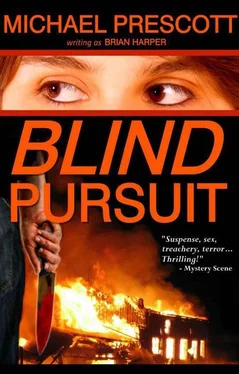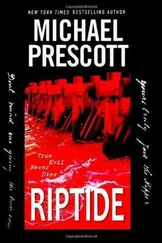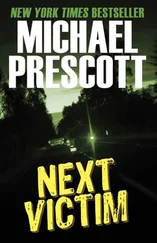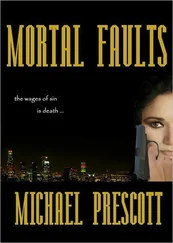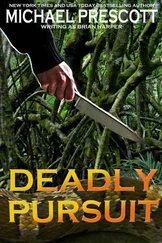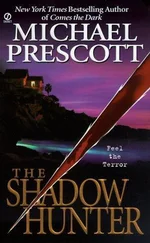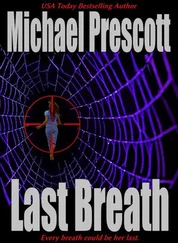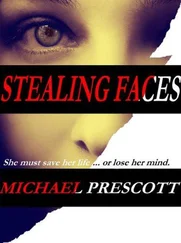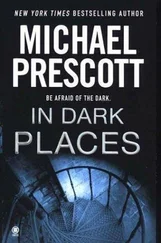Michael Prescott - Blind Pursuit
Здесь есть возможность читать онлайн «Michael Prescott - Blind Pursuit» весь текст электронной книги совершенно бесплатно (целиком полную версию без сокращений). В некоторых случаях можно слушать аудио, скачать через торрент в формате fb2 и присутствует краткое содержание. Жанр: Триллер, на английском языке. Описание произведения, (предисловие) а так же отзывы посетителей доступны на портале библиотеки ЛибКат.
- Название:Blind Pursuit
- Автор:
- Жанр:
- Год:неизвестен
- ISBN:нет данных
- Рейтинг книги:5 / 5. Голосов: 1
-
Избранное:Добавить в избранное
- Отзывы:
-
Ваша оценка:
- 100
- 1
- 2
- 3
- 4
- 5
Blind Pursuit: краткое содержание, описание и аннотация
Предлагаем к чтению аннотацию, описание, краткое содержание или предисловие (зависит от того, что написал сам автор книги «Blind Pursuit»). Если вы не нашли необходимую информацию о книге — напишите в комментариях, мы постараемся отыскать её.
Blind Pursuit — читать онлайн бесплатно полную книгу (весь текст) целиком
Ниже представлен текст книги, разбитый по страницам. Система сохранения места последней прочитанной страницы, позволяет с удобством читать онлайн бесплатно книгу «Blind Pursuit», без необходимости каждый раз заново искать на чём Вы остановились. Поставьте закладку, и сможете в любой момент перейти на страницу, на которой закончили чтение.
Интервал:
Закладка:
While she slept, her abductor must have removed the chain and both padlocks, then brought them in here and shackled her. Christ, shackled her to the wall-like a prisoner in a dungeon.
Well, what else was she? What had she ever been?
She struggled to her feet, gingerly testing her legs. Though her knees were stiff and her balance uncertain, she could walk.
She tried reaching the door, couldn’t. The chain, drawn taut to a length of six feet, stopped her when she was still more than a yard away.
He was taking no chances, quite obviously. He didn’t want her escaping again.
Little likelihood of that, anyway. He’d cleaned out the room, removing all possible lock-picking tools, leaving only a bare minimum of necessities. Besides the futon, all she had left were the two chairs, a roll of toilet paper, the milk jugs and coffee cans she used for bathroom purposes, and, in the cardboard box, a few items of food-none requiring the can opener, which was gone.
Painfully she shuffled over to the sillcock. Crouching down was an exercise in self-torture so intense it was almost pleasurable. She turned the handle and cupped her hands under the lukewarm stream from the spout, drinking until she was satisfied.
A memory of the awful thirst she had known in the arroyo returned to her. It was said to be impossible to remember physical sensations, but the sandpaper dryness of her mouth, the swollen thickness of her tongue, the ache of her gums-all of it was abruptly vivid in her mind, as shockingly real as direct experience.
Not again, she promised herself, straightening up with a renewed protest of sore muscles. She would not be staked out again-to endure the elements or to burn. If he tried to take her, she would fight. She would make him kill her here.
Would it come to that? She blinked at the question, then nodded slowly. Of course it would.
She had been granted only a reprieve, a stay of execution. He would never let her go. Never.
She had seen his face.
Only dimly, it was true-in weak light outside, and through a haze of visual distortion in this room. Nonetheless, she had seen it.
And the ranch, too.
The ranch.
There it was again, startling as a slap-the wordless certainty that she had visited this place before.
Baking in the sun, she’d had no strength to ponder the riddle. Now she did.
A horse ranch in the desert, near the interstate.
Barbed-wire fence, wood-frame house, barn and paddock. The buildings painted green, white, and orange.
Green, white, and orange…
“Oh, my God,” Erin whispered, remembering.
Her knees unlocked. She would have crumpled to the floor if she hadn’t gripped the brick wall for support.
In her mind she saw it suddenly-the ranch, this ranch, spread out before her, not in starlight but in the crisp May sunshine of another year, the buildings dressed in faded colors, paint peeling in strips like sunburned skin.
And at the entrance, a padlocked gate that displayed a hanging sign.
The sign was gone now. She hadn’t seen it last night.
But on that spring day in 1985 she and Annie had paused before that sign, reading the inscription grooved deep in the rust-eaten iron.
A single word in block letters: CONNOR.
This was the old Connor ranch. Lincoln and Lydia’s homestead, where they had spent the twenty years of their marriage.
Erin knew it, knew it with certainty, even without the sign as proof. The distinctive color scheme was confirmation enough. Green, white, orange-the colors of the Irish flag.
After the deaths of her husband and son in 1968, Lydia Connor had relocated to a bungalow in town, where, later, she raised her orphaned nieces. She rarely spoke of the ranch, never took the girls to see it, but in her photo albums there were pictures of a house and barn, a paddock with a split-rail fence, horses grazing on a few bleached acres.
In the second semester of her freshman year at the University of Arizona, Erin signed up for a course on the history of Tucson. At the library, hunting through the archival files of local newspapers to research her term paper, she came across contemporaneous accounts of the Connor case. One of the stories gave the couple’s address.
The next weekend, impelled by curiosity, she and Annie visited the ranch. The map they used was disappointingly inaccurate, and it took them forty minutes of searching in Annie’s old rattletrap Dodge, with the vents blowing hot air and the brakes squealing ominously, before they finally pulled to a stop outside a spread that matched the faded photos. The location, Erin recalled with a low incline of her head, was a side road off Houghton, just north of Interstate 10.
The Connor ranch never had been a large-scale operation, even when Lincoln’s parents had run the place. By the time Lincoln himself took possession of the title, most of the acreage had been sold off; what little remained had been adequate only for the pasturage of a half dozen horses, mostly elderly animals maintained at the expense of good-hearted owners.
The developer who’d purchased the ranch and acres of adjacent land in 1968 had meant to convert the property into housing tracts, but his ambitious plans had fallen through. The Connor homestead and the land around it, remote and unwanted, had been forgotten. When Erin and Annie found the ranch in 1985, it lay in forlorn disrepair, unoccupied for seventeen years.
Well, it was occupied now. Her abductor had bought it. Bought it and taken down the sign.
But why? What would he want with it? What could this place possibly mean to him?
Nothing, obviously-unless he’d lived here himself.
But no one had lived here in years, in decades. No one had lived here since Lydia, Lincoln, and…
“Oliver,” she breathed.
The thought was dazzling like a blow. She groped for the chair and sank into it.
The man holding her captive couldn’t be Oliver Ryan Connor.
Oliver was dead.
Wasn’t he? Wasn’t he?
Eyes shut, lips pursed, Erin tried to recall what little she had ever known about Lydia’s son.
Most of what she’d heard had been local gossip, circulated in school. The murder-suicide had been a noteworthy local news item in 1968, and even in the mid-’70s, when Erin and Annie were growing up in Lydia’s house, it had not been forgotten. Other kids their age had heard the details from older siblings, and when they learned the two girls were living with Lydia Connor, they had talked.
From them, and later in more detail from the library’s newspaper archives, Erin had learned how Lincoln Connor had tracked down his son, shot him, and turned the gun on himself.
That was the official version, at least, the one accepted by everybody. But suppose it wasn’t the truth. Suppose Oliver hadn’t died in that clearing of Prescott National Forest, but somehow had duped the authorities into believing otherwise.
Suppose he’d changed his identity, relocated to the Great Lakes region, only to find that his first episode of homicidal violence wasn’t enough, that the same compulsion to kill would rise in him periodically, when his fingers would tingle and his ears would chime.
The aura phase. First stage of a seizure, perhaps an epileptic fugue state…
“Of course,” Erin murmured.
He was Oliver. He must be.
Because she, too, was an epileptic. For both of them to suffer from variants of the same affliction could not be a coincidence.
Having studied epilepsy to better understand her own condition, she knew how rare it was. Less than one percent of the general population exhibited the syndrome. But among children of epileptics, the percentage ran as high as six percent. And when both parents had epilepsy, the percentage of affected children rose to twenty-five percent, clearly demonstrating the affliction’s hereditary component.
Читать дальшеИнтервал:
Закладка:
Похожие книги на «Blind Pursuit»
Представляем Вашему вниманию похожие книги на «Blind Pursuit» списком для выбора. Мы отобрали схожую по названию и смыслу литературу в надежде предоставить читателям больше вариантов отыскать новые, интересные, ещё непрочитанные произведения.
Обсуждение, отзывы о книге «Blind Pursuit» и просто собственные мнения читателей. Оставьте ваши комментарии, напишите, что Вы думаете о произведении, его смысле или главных героях. Укажите что конкретно понравилось, а что нет, и почему Вы так считаете.
